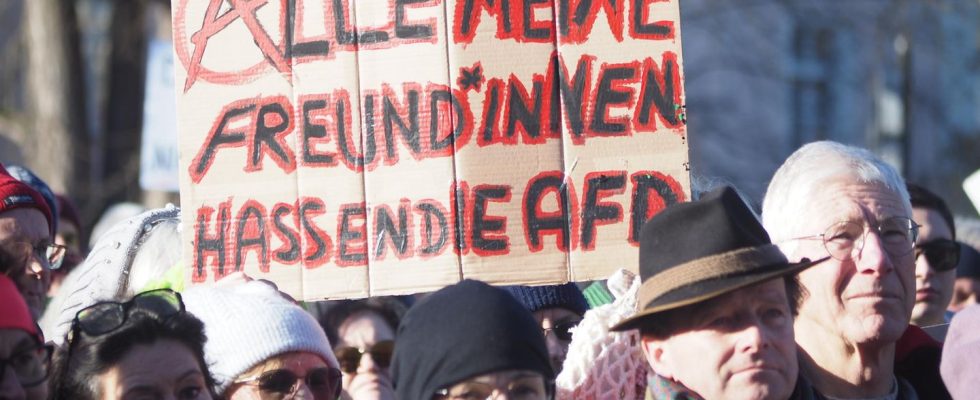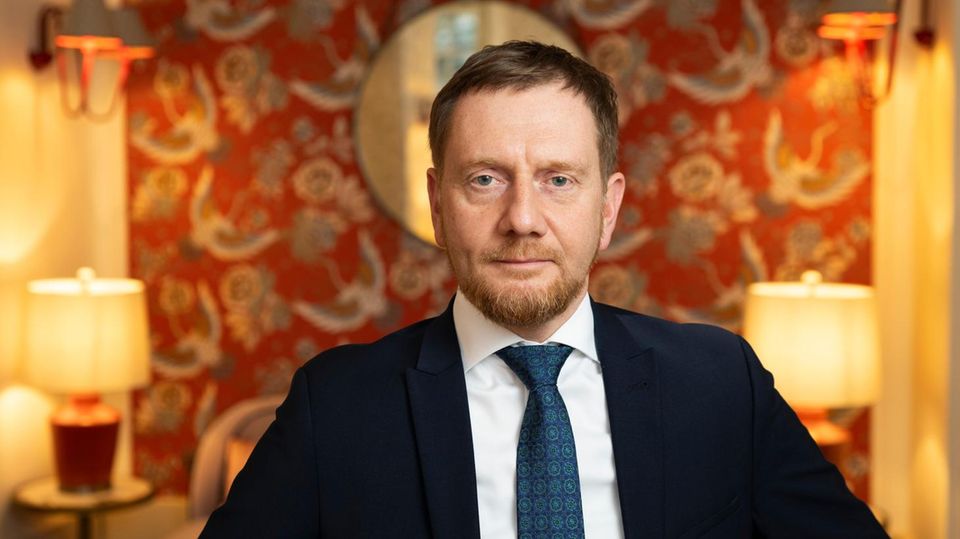What follows from the demos against right-wing extremism? In order to stop the rise of the AfD, we have to address its content without hysteria. For all progressives this means questioning naive points of view.
A guest article by Magali Mohr-Ahlers
What would I have done if I had witnessed Hitler’s attempted coup in 1923? Or if I had experienced the November pogroms in 1938? Many of us have asked ourselves these questions before. Now is the time to find out, is what we often hear these days. Research into a secret meeting of right-wing extremists and representatives of the AfD in Potsdam, where the deportation of immigrants was discussed, woke up large parts of society.
Now we have to show that we take the oft-quoted “Never again” seriously. This feeling has driven hundreds of thousands of people, including me personally, onto the streets in recent weeks. The times of paralyzing indifference and a naive attitude towards the AfD as a supposed protest party are over. And so on many of the posters shown at the demonstrations one can logically read, “Never again is now!”.
But what I also read there are sentences that make me think. For example, it says: “Everyone hates the AfD!”, “The whole of Berlin hates the AfD!” or “AfD = Nazis”. Although I intuitively want to agree with these statements, upon second glance I doubt not only the content of these messages, but also how useful they are from a strategic point of view in the fight against right-wing extremism and the rise of the AfD.
A third of AfD supporters are right-wing extremists
Yes, the AfD is extremely dangerous – we shouldn’t just have known that since the meeting in Potsdam. Often enough, their representatives have shown in speeches or private messages that have become public how inhumane they think of people of other origins and how little they think of pluralistic party systems and media landscapes. Only recently did the Office for the Protection of the Constitution identify three regional associations of the AfD youth organization “Junge Alternative”. definitely classified as right-wing extremist. And Björn Höcke, the AfD’s top candidate in the upcoming state elections in Thuringia, is currently the one Accused of sedition.
If they come to power, they will attempt to infiltrate and undermine our democratic system. For precisely this reason, it is not an option to bring down the AfD by letting them co-govern – as happened recently Marc Felix Sarrao suggested in the NZZ. The risk to our democracy would be too high and the experience of Trump’s presidency shows that participation in government in no way leads to de-radicalization or lower approval ratings.
Political scientist Magali Mohr-Ahlers
© d-part
Nevertheless, we must recognize that “the AfD” consists of far more members than the handful of MPs you read about in newspapers. On the contrary: it is finding favor with more and more voters – in surveys the party currently has approval ratings of around twenty percent. Studies like that of Hans Böckler Foundation show that the AfD is no longer a pure protest party: most people vote for it not despite, but because of its thematic orientation.
But that doesn’t mean that all voters are right-wing extremists. Loud Analyzes by Infratest dimap, around 27 percent, i.e. almost a third of AfD supporters, can be classified as right-wing extremist, while 25 percent are considered “strongly right-wing”. For comparison: In the total population there are a constant 8 percent who are classified as right-wing extremist. The AfD has succeeded in gaining a foothold, particularly in this outer right-wing milieu. Conversely, this also means that at least half of the electorate comes from the middle of society.
Democracy must never tolerate right-wing extremism
Hatred and the demonization of everyone who sympathizes with the AfD will not help us, nor will the moralizing and arrogant attempts to generally delegitimize the AfD’s topics and perspectives as unspeakable or populist. This behavior, which I also experience in my circle of friends and increasingly on social media, only leads to further alienation between AfD sympathizers, the democratic parties and the rest of the population. Only the AfD benefits from this. And many politicians are currently on the wrong path.
On the one hand, there is the Chancellor, who thinks he can score points with AfD voters with a polemical magazine cover – “We finally have to deport people on a large scale.” He seems to have little concern about the impact of such a message on migrant communities in Germany. On the other side is the Federal Association of the Greens, which, presumably out of a desire to show “attitude”, shares the slogan “Being against the right is our democratic duty” on Instagram and thus reveals a very twisted understanding of democracy.
Whether we like it or not, “right-wing” is part of the democratic political spectrum.
However, we can and must never tolerate right-wing extremism in our democracy. That’s why taking up the AfD’s inhumane rhetoric and destructive narratives must remain a taboo for pro-democratic politicians. But they must finally stop accusing each other of “moving to the right” on talk shows as soon as even partial aspects of the AfD’s topics and arguments are declared justified. In any case, it is no longer about the classic understanding of “right” and “left” – this is shown not least by the recently founded party “Alliance Sahra Wagenknecht”, which pursues a similarly restrictive migration policy as the AfD.
Question the naive view of migration
In order to stop the rise of the AfD, we must deal seriously and without hysteria with its agenda and criticism. To do this, we should, on the one hand, work out which topics – as much as it hurts to admit it – she represents legitimate points of criticism. These include the high tax burden on the middle class as well as the highest electricity and energy prices for industry and citizens compared internationally. The accusation of dysfunctional migration policy must also be discussed honestly.
On the other hand, the AfD must be positioned with all determination and clarity in terms of content where it uses ethnic-nationalist language and narratives. We must expose their racist, inhumane and anti-democratic politics as such.
This open confrontation with the AfD, its issues and its electorate is not easy. It will be most difficult for us who see ourselves as progressive. Because it also means that we have to look at our own noses and question our sometimes naive view of issues such as migration. We have to talk about how we deal with migrants who commit criminal offenses or who do not respect our constitution.
Also those in Germany proven We cannot simply remain silent about the anti-Semitic attitudes that are widespread among some Muslims. Because: “Never again” not only means that we have to fight right-wing extremism, but that we must not tolerate anti-Semitism in any form. Never. In no institution, organization, meeting, demonstration or even in the family circle. The fact that attacks on people of Jewish faith have increased in recent months and years is an indictment. In order to combat anti-Semitism, we must identify the individuals and groups that cause it and combat them vigorously.
“Never again” means protecting people of Muslims and all faiths from the AfD’s deportation fantasies, from xenophobia and racism, as well as protecting people of Jewish faith from anti-Semitism – including those from migrant communities. Democratic processes and values are complex, demanding and require differentiated approaches. They are an imposition. But one that we as democrats can all accept.
Magali Mohr-Ahlers studied European Studies in Maastricht and Global Migration at University College London. After several years in opinion and democracy research, she now works in science communication in Berlin. She is a member of Alliance 90/The Greens.



